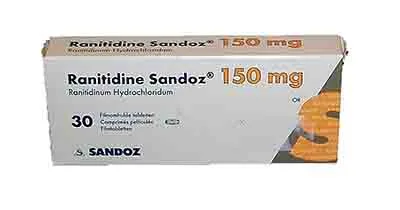- Your cart is empty
- Continue Shopping
RANITIDINE
$30.24 – $137.59
Ranitidine is used for treating certain conditions that cause your body to make too much stomach acid (eg, Zollinger-Ellison syndrome).
TO VIEW PRICE ON MOBILE CLICK ADD TO CART
- Canadian Pharmacy Online Pharmacy | Online Canadian Pharmacy
- Need More Information Call Us 1-833-356-6337
Product description
INDICATIONS
Ranitidine is used for treating certain conditions that cause your body to make too much stomach acid (eg, Zollinger-Ellison syndrome). It is also used to treat ulcers of the small intestine that have not responded to other treatment. It may be used as a short-term alternative to oral ranitidine, in patients who are not able to take medicine by mouth. Ranitidine is an H2-receptor blocker. It works by blocking the action of histamine in the stomach. This reduces the amount of acid the stomach makes. Reducing stomach acid helps to reduce heartburn, heal irritation of the esophagus, and heal ulcers of the stomach or intestines.
INSTRUCTIONS
Use Ranitidine as directed by your doctor.
- Do not take the medication in larger amounts, or take it for longer than recommended by your doctor. Follow the directions on your prescription label.
- You may take antacids while you are using Ranitidine if you are directed to do so by your doctor.
- Continue to use Ranitidine even if you feel well. Do not miss any dose.
- If you miss a dose of Ranitidine, use it as soon as possible. If it is almost time for your next dose, skip the missed dose and go back to your regular dosing schedule. Do not use 2 doses at once.
Ask your health care provider any questions you may have about how to use Ranitidine.
STORAGE
Store Ranitidine between 68 and 77 degrees F (20 and 25 degrees C). Brief storage at temperatures between 59 and 86 degrees F (15 and 30 degrees C) is permitted. Store away from heat, moisture, and light. Do not store in the bathroom. Keep Ranitidine out of the reach of children and away from pets.
Safety information
INDICATIONS
Ranitidine is used for treating certain conditions that cause your body to make too much stomach acid (eg, Zollinger-Ellison syndrome). It is also used to treat ulcers of the small intestine that have not responded to other treatment. It may be used as a short-term alternative to oral ranitidine, in patients who are not able to take medicine by mouth. Ranitidine is an H2-receptor blocker. It works by blocking the action of histamine in the stomach. This reduces the amount of acid the stomach makes. Reducing stomach acid helps to reduce heartburn, heal irritation of the esophagus, and heal ulcers of the stomach or intestines.
INSTRUCTIONS
Use Ranitidine as directed by your doctor.
- Do not take the medication in larger amounts, or take it for longer than recommended by your doctor. Follow the directions on your prescription label.
- You may take antacids while you are using Ranitidine if you are directed to do so by your doctor.
- Continue to use Ranitidine even if you feel well. Do not miss any dose.
- If you miss a dose of Ranitidine, use it as soon as possible. If it is almost time for your next dose, skip the missed dose and go back to your regular dosing schedule. Do not use 2 doses at once.
Ask your health care provider any questions you may have about how to use Ranitidine.
STORAGE
Store Ranitidine between 68 and 77 degrees F (20 and 25 degrees C). Brief storage at temperatures between 59 and 86 degrees F (15 and 30 degrees C) is permitted. Store away from heat, moisture, and light. Do not store in the bathroom. Keep Ranitidine out of the reach of children and away from pets.
Side effects
All medicines may cause side effects, but many people have no, or minor, side effects.
Check with your doctor if any of these most common side effects persist or become bothersome:
Constipation; diarrhea; headache; nausea; stomach upset.
Seek medical attention right away if any of these severe side effects occur:
Severe allergic reactions (rash; hives; itching; difficulty breathing; tightness in the chest; swelling of the mouth, face, lips, or tongue; unusual hoarseness); change in the amount of urine produced; confusion; dark urine; depression; fast, slow, or irregular heartbeat; fever, chills, or sore throat; hallucinations; severe or persistent headache or stomach pain; unusual bruising or bleeding; yellowing of the eyes or skin.
This is not a complete list of all side effects that may occur. If you have questions about side effects, contact your health care provider.
Need More Information? Call Us Toll Free: 1-833-356-6337
| MG | 300 mg, 150 mg |
|---|---|
| Package | 60 pills, 90 pills, 120 pills, 180 pills, 270 pills, 360 pills |
Related Products
ROGAINE 5
Can't Login into Your Account?
Call Us: 1-833-356-6337

We Accept Credit Cards, International Money Orders, Cash, Certified Checks and Bank Transfer
Canada Canadian Pharmacy dispenses all medications from licensed and regulated independent pharmacy partners internationally, including but not limited to Australia, Canada, New Zealand, India, Mauritius, Turkey, United States, Singapore and the United Kingdom. All Images on this site are registered trademarks of original manufacturers, international exporters, and property of their respective owners and are for reference only. Canada Pharmacy Online procures all products from licensed regulated international in order to provide you unbeatable lowest prices and prescription discounts for all your prescription medications, medications and Canadian Drugs at Canada Pharmacy Online.
CUSTOMER INFORMATION
TOP SELLERS
2005-2023 Rxdrugscanada.com





